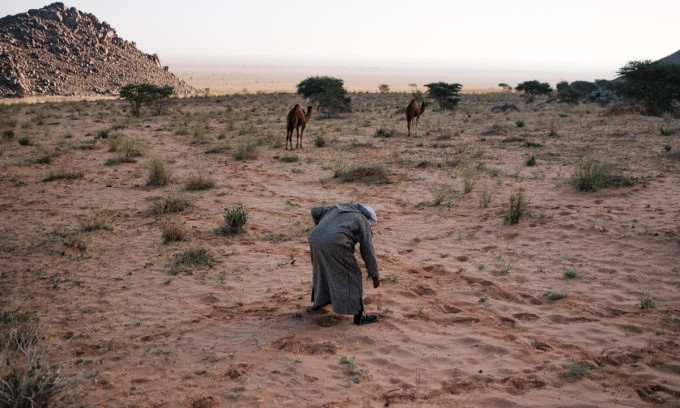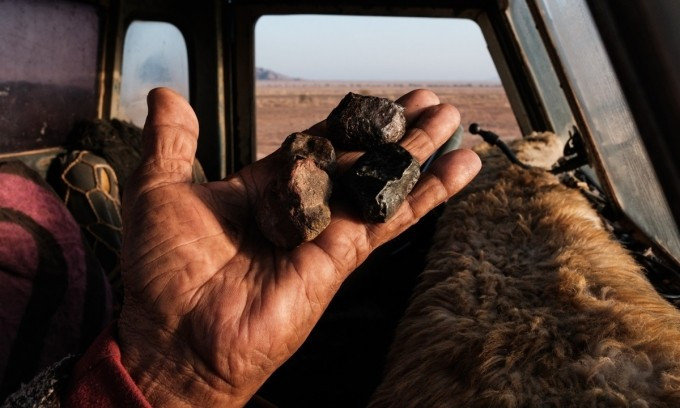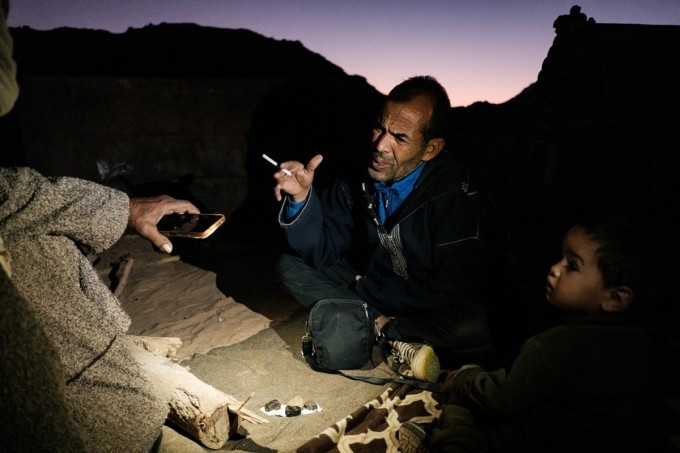Scientists estimate that more than 45 tons of meteorite material enters the Earth’s atmosphere every day. Most of it burns up, forming shooting stars. Of the few meteorites that don’t burn up, most fall into the ocean. The rest go largely unnoticed, mixed in with Earth’s other natural rocks.
But in the vast deserts of Mauritania, in northwest Africa, herders have learned to look for meteorites, which they say often have dark surfaces due to melting as they pass through the atmosphere. While such meteorites are found everywhere, scientists say they are especially visible in places like the desert, where they stand out against the yellows and browns of the sand.
Meteorite hunting has become a hobby for local people and also a money-making opportunity.

The drive from Nouakchott, the capital of Mauritania, to the nomadic camp of Bir Moghrein in the Sahara takes at least 18 hours. The second half of the journey is sandy and without any road signs.
In 2011, nomads in neighboring Morocco reported seeing a fireball light up the sky. Scientists later confirmed that a giant Martian meteorite, which they named Tissint, had fallen into the country. Pieces of it were distributed to museums, research institutes, and collectors. Researchers believe they may contain evidence of water on Mars.
The discovery sparked a wave of curiosity across the region. News of the discovery spread to the farthest reaches of Mauritania. The search for the meteorite was on.
Mohamed Bagouma, a herder and meteorite hunter from Bir Moghrein, said he started searching for space rocks about a decade ago.
“To me, it was strange,” Bagouma said. “We used to think those stones were useless.”
As Bagouma and his son trekked across the desert with their camels, they kept their eyes on the ground. Bagouma said he had only found a valuable meteorite once, but he was hopeful. He recalled another herder who had found a meteorite so valuable that it had given him enough money to move his family to the city.
Bagouma often brought the stones he collected to Lamine Henoun, a local expert.
Henoun, 50, who studied literature in college and speaks several languages, now works part-time as a security guard. He has taught himself about meteorites. The most common type, he says, is chondrite, which comes from the asteroid belt. The rarest and most valuable come from Mars and the Moon.
“This one is pretty good,” Henoun said, examining the stones Bagouma brought in on a recent evening.
From his small bag, Henoun pulled out a magnifying glass and a magnet. Most meteorites contain iron-nickel, an alloy that attracts magnets and is absent from Earth rocks. He held the magnet close to the most promising rock and shook his head in disappointment. It did not attract the magnet.
“Finding meteorites is mostly based on luck,” Henoun said.
Herders bring him rocks every day, but Henoun only finds one or two valuable ones a month. On those occasions, he goes to the town’s customs office, connects to Starlink internet there, and posts photos on Facebook and TikTok in the hopes of attracting collectors.

He once made $55 from selling a rare chondrite. It was the most Henoun had ever made from a meteorite. It was nearly his monthly income. “The poor people here don’t really benefit much,” Henoun said.
Ahmedou Cheikh Abba is an exception. The 36-year-old cleric said he had never been interested in meteorites until 2023, when he joined a gold mining group near the Algerian border.
During a break, he saw “a rock that was darker than the others.” “There was a lot of color in it. I knew it was a sign of a meteorite,” Abba said.
He posted a photo of the rock on Facebook and received a lot of feedback. Abba then sold it for $2,500 to a buyer from Morocco who believed the rock was a lunar meteorite.
But after further analysis, the man determined that it was just a regular rock. However, by then, Abba had already shared the money with his family and taken the children on vacation.
“Everyone knows that meteorite hunting is risky,” he shrugged.
Meteorite hunting is largely unregulated in Mauritania. On a recent day in Nouakchott, a group of middle-aged men, all claiming to be meteorite traders, sat chatting animatedly on the side of the road. As a reporter approached, they pulled out stones of all colors and sizes.
Hama Sidi Othaman smiled as he showed off his haul. He said he has been hunting for meteorites since 2011 and is offering one for $64,000. He said it was a bargain for anyone interested in collecting meteorites.
"It definitely came from the Moon," Othaman asserted.
Ely Cheikh Mohamed Navee is currently the president of the Mauritanian Astronomical Society. According to Navee, he is the only Mauritanian with a PhD in planetary sciences.
Navee said Mauritania currently has six potential impact craters, two of which have been confirmed by scientists and recorded in the Earth Impact Database.

Robert Ward, a meteorite collector in Arizona, is one of a growing number of people who are promoting the trade in space rocks. Ward says some of the best specimens he has collected come from North Africa, including Mauritania.
He raised the possibility that there are similar treasures scattered across the American Southwest. “But people here just sit and watch TV,” Ward said. “They look for them every day.”
Although Mauritania has no museum housing meteorites nor a commensurate market for them, Navee insists his country still has a clear advantage.
"Nomads are the best collectors in the world ," he said.
“Meteorites found in Mauritania can teach us a lot about the universe and our place in it,” Navee stressed. “The future lies in things coming from space.”
Source: https://baohatinh.vn/nhung-nguoi-san-thien-thach-giua-sa-mac-post287027.html


![[Photo] Prime Minister Pham Minh Chinh receives a bipartisan delegation of US House of Representatives](https://vphoto.vietnam.vn/thumb/1200x675/vietnam/resource/IMAGE/2025/5/28/468e61546b664d3f98dc75f6a3c2c880)
![[Photo] 12th grade students say goodbye at the closing ceremony, preparing to embark on a new journey](https://vphoto.vietnam.vn/thumb/1200x675/vietnam/resource/IMAGE/2025/5/28/42ac3d300d214e7b8db4a03feeed3f6a)

![[Photo] Vietnamese and Hungarian leaders attend the opening of the exhibition by photographer Bozoky Dezso](https://vphoto.vietnam.vn/thumb/1200x675/vietnam/resource/IMAGE/2025/5/28/b478be84f13042aebc74e077c4756e4b)
![[Photo] General Secretary To Lam works with the Central Policy and Strategy Committee](https://vphoto.vietnam.vn/thumb/1200x675/vietnam/resource/IMAGE/2025/5/28/7b31a656d8a148d4b7e7ca66463a6894)





















































































Comment (0)